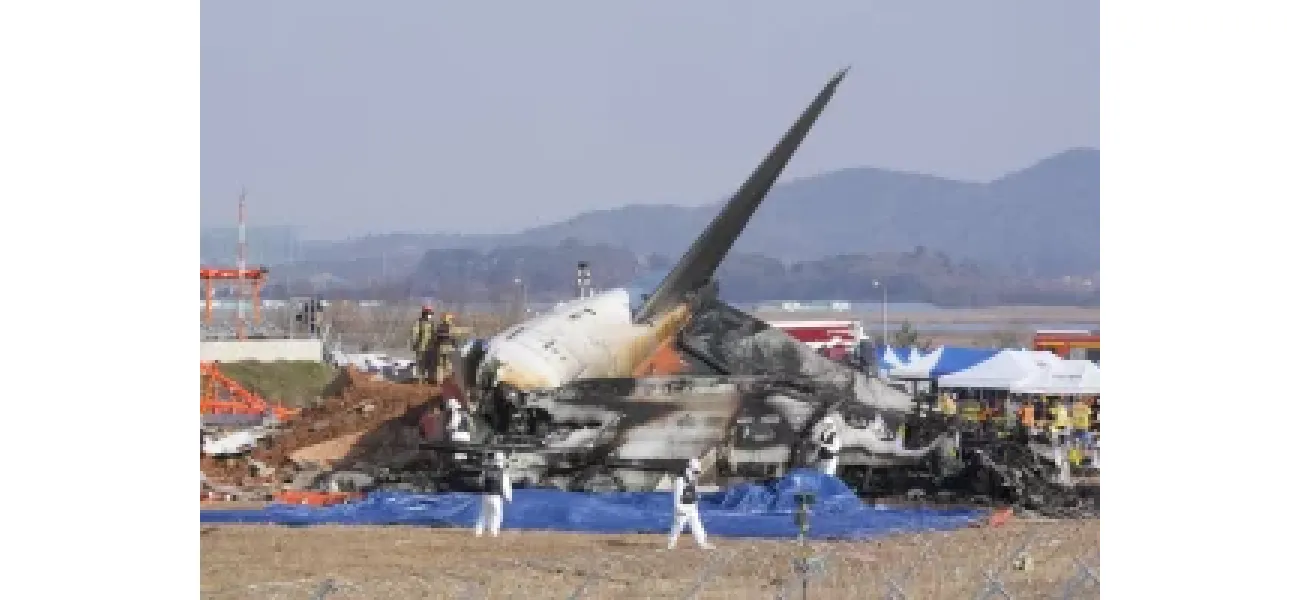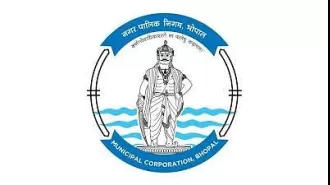179 dead as plane catches fire during landing in South Korea.
Plane crashes in South Korea, leaving almost all passengers dead due to front landing gear failure.
December 29th 2024.

On a fateful Sunday, a passenger plane traveling to South Korea met a disastrous end when it skidded off the runway, crashed into a concrete fence, and burst into flames. Reports indicate that the front landing gear failed to deploy, leading to the tragic incident that claimed the lives of all but two of the 181 people on board. It was a heart-wrenching event that will go down as one of the worst aviation disasters in the country's history.
The ill-fated Jeju Air flight was attempting to land in the town of Muan, located about 290 kilometers south of Seoul. According to the Transport Ministry, the aircraft was a 15-year-old Boeing 737-800 that had just arrived from Bangkok. The crash occurred at 9:03 am, sending shockwaves throughout the nation.
Tragically, out of the 179 people who lost their lives in the fire, only two were able to be rescued. These two individuals were both crew members and, thankfully, were conscious and in stable condition. The fire agency reported that the majority of the victims were South Korean, with two Thai nationals also among the fatalities.
The fire agency responded swiftly, deploying 32 fire trucks and multiple helicopters to the crash site. In total, about 1,570 firefighters, police officers, soldiers, and other officials were involved in the rescue and recovery efforts. However, the severity of the crash and subsequent fire made it challenging to save many lives.
Disturbing footage of the crash was broadcasted on South Korean television, showing the plane careening across the runway without its landing gear deployed. It then overshot the runway, collided with a concrete wall, and exploded into flames. Thick black smoke engulfed the aircraft, making it almost unrecognizable.
At a televised briefing, Lee Jeong-hyeon, the chief of the Muan fire station, revealed the devastating extent of the damage. The plane was completely destroyed, with only the tail assembly remaining recognizable among the wreckage. Lee also shared that they were investigating all possible causes of the crash, including the possibility of a bird strike.
Transport Ministry officials later confirmed that the control tower had issued a bird strike warning to the plane just before its intended landing and had given the pilot permission to land in a different area. However, moments later, the pilot sent out a distress signal, and the aircraft overshot the runway, skidding across a buffer zone before hitting the wall.
Senior Transport Ministry official Joo Jong-wan stated that the flight data and cockpit voice recorders, also known as the black box, had been retrieved and would be examined by government experts. However, it may take months for them to complete their investigation. In the meantime, the Muan airport's runway was closed until January 1st.
As news of the tragedy spread, condolences poured in from around the world. Thailand's Prime Minister, Paetongtarn Shinawatra, expressed her deep sympathies and ordered immediate assistance for those affected by the accident. Meanwhile, Kerati Kijmanawat, the director of Airports of Thailand, confirmed that the flight had departed from Suvarnabhumi Airport without any reports of abnormalities.
In a statement, Jeju Air expressed its sincere apologies for the crash and promised to do everything in its power to manage the aftermath of the accident. During a news conference, the company's president, Kim E-bae, bowed deeply and took full responsibility for the incident. He also assured the public that the aircraft had undergone regular checkups, and no mechanical problems were identified.
The families of the victims received the devastating news of their loved ones' passing at a lounge in the Muan airport. As they grieved, officials continued their efforts to identify the victims and provide assistance to their families. Boeing also released a statement expressing its condolences and offering support to Jeju Air.
The crash in Muan is one of the deadliest aviation disasters in South Korea's history, with the last one occurring in 1997. The incident also brought back memories of the 2013 Asiana Airlines crash in San Francisco, which claimed three lives. It is also one of the worst landing mishaps since a 2007 crash in Sao Paulo, where 199 people lost their lives.
As the nation mourns the loss of so many lives, world leaders have also expressed their sympathies. Pope Francis prayed for the survivors and the deceased, while Japanese Prime Minister Shigeru Ishiba and Ukrainian President Volodymyr Zelenskyy sent their heartfelt condolences. It is a tragedy that will not soon be forgotten, as the country continues to come to terms with the devastating loss.
The ill-fated Jeju Air flight was attempting to land in the town of Muan, located about 290 kilometers south of Seoul. According to the Transport Ministry, the aircraft was a 15-year-old Boeing 737-800 that had just arrived from Bangkok. The crash occurred at 9:03 am, sending shockwaves throughout the nation.
Tragically, out of the 179 people who lost their lives in the fire, only two were able to be rescued. These two individuals were both crew members and, thankfully, were conscious and in stable condition. The fire agency reported that the majority of the victims were South Korean, with two Thai nationals also among the fatalities.
The fire agency responded swiftly, deploying 32 fire trucks and multiple helicopters to the crash site. In total, about 1,570 firefighters, police officers, soldiers, and other officials were involved in the rescue and recovery efforts. However, the severity of the crash and subsequent fire made it challenging to save many lives.
Disturbing footage of the crash was broadcasted on South Korean television, showing the plane careening across the runway without its landing gear deployed. It then overshot the runway, collided with a concrete wall, and exploded into flames. Thick black smoke engulfed the aircraft, making it almost unrecognizable.
At a televised briefing, Lee Jeong-hyeon, the chief of the Muan fire station, revealed the devastating extent of the damage. The plane was completely destroyed, with only the tail assembly remaining recognizable among the wreckage. Lee also shared that they were investigating all possible causes of the crash, including the possibility of a bird strike.
Transport Ministry officials later confirmed that the control tower had issued a bird strike warning to the plane just before its intended landing and had given the pilot permission to land in a different area. However, moments later, the pilot sent out a distress signal, and the aircraft overshot the runway, skidding across a buffer zone before hitting the wall.
Senior Transport Ministry official Joo Jong-wan stated that the flight data and cockpit voice recorders, also known as the black box, had been retrieved and would be examined by government experts. However, it may take months for them to complete their investigation. In the meantime, the Muan airport's runway was closed until January 1st.
As news of the tragedy spread, condolences poured in from around the world. Thailand's Prime Minister, Paetongtarn Shinawatra, expressed her deep sympathies and ordered immediate assistance for those affected by the accident. Meanwhile, Kerati Kijmanawat, the director of Airports of Thailand, confirmed that the flight had departed from Suvarnabhumi Airport without any reports of abnormalities.
In a statement, Jeju Air expressed its sincere apologies for the crash and promised to do everything in its power to manage the aftermath of the accident. During a news conference, the company's president, Kim E-bae, bowed deeply and took full responsibility for the incident. He also assured the public that the aircraft had undergone regular checkups, and no mechanical problems were identified.
The families of the victims received the devastating news of their loved ones' passing at a lounge in the Muan airport. As they grieved, officials continued their efforts to identify the victims and provide assistance to their families. Boeing also released a statement expressing its condolences and offering support to Jeju Air.
The crash in Muan is one of the deadliest aviation disasters in South Korea's history, with the last one occurring in 1997. The incident also brought back memories of the 2013 Asiana Airlines crash in San Francisco, which claimed three lives. It is also one of the worst landing mishaps since a 2007 crash in Sao Paulo, where 199 people lost their lives.
As the nation mourns the loss of so many lives, world leaders have also expressed their sympathies. Pope Francis prayed for the survivors and the deceased, while Japanese Prime Minister Shigeru Ishiba and Ukrainian President Volodymyr Zelenskyy sent their heartfelt condolences. It is a tragedy that will not soon be forgotten, as the country continues to come to terms with the devastating loss.
[This article has been trending online recently and has been generated with AI. Your feed is customized.]
[Generative AI is experimental.]
0
0
Submit Comment





